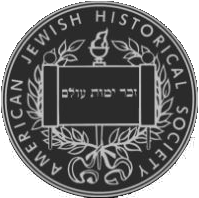AJHS Academic Awards
The American Jewish Historical Society encourages interested students and scholars to apply for the following prizes and fellowships. Please note that the AJHS Academic Council is responsible for all selections.
Saul Viener Book Prize
The Saul Viener Book Prize is awarded biennially by the American Jewish Historical Society Academic Council to honor outstanding books focused on the history of Jews in the Americas. This year’s Viener Book Prize committee was privileged to review more than two dozen books addressing various dimensions of the American Jewish experience and reflecting the dramatic growth of our field in recent years.
The committee is pleased to announce that the Viener Prize for 2023-2024 is awarded to Geoffrey Levin for his book, Our Palestine Question: Israel and American Jewish Dissent, 1948-1978 (Yale University Press, 2023). Our Palestine Question challenges the common perception that Palestinian rights became an issue on the world stage only after 1967 by detailing the efforts of American Jews to raise this topic with Israeli officials and Zionist organizations in the decades immediately after the founding of the State of Israel. Deeply researched and beautifully written, Levin’s compelling account reveals how relations between American Jews and Israel entailed an ongoing contest of visions and priorities among a broad spectrum of advocates and activists, diplomats and politicians, and leaders of non-governmental organizations. He sensitively explores the complicated moral and political questions that drove this interchange as he investigates how, in his words, the American Jewish debate over the “Palestine Question” was ultimately “a struggle over Jewish identity.” This timely book is important reading for anyone wishing to more deeply understand the history of American Jewish engagement with both Israel and the question of Palestinian rights.
The committee also wishes to recognize that Ronnie A. Grinberg’s Write Like a Man: Jewish Masculinity and the New York Intellectuals (Princeton University Press, 2024) deserves honorable mention. Exploring the work of the New York intellectuals through the lens of gender, Grinberg argues persuasively that these writers and opinion makers embraced an ideology of “secular Jewish masculinity” that “prized verbal combativeness, polemical aggression, and an unflinching style of argumentation.” Demonstrating how this ideology influenced not only male Jewish intellectuals but also many prominent female and non-Jewish writers and thinkers, Grinberg reveals how a worldview rooted in Jewish experience came to shape debate on some of the most consequential episodes and ideas of twentieth-century American life.
Congratulations to Geoffrey Levin on this award and Ronnie A. Grinberg for honorable mention!
Saul Viener Book Prize Committee for 2025:
Eric L. Goldstein (chair), Libby Garland, Daniel Greene
Wasserman Essay Prize
The Wasserman Essay Prize is awarded yearly for the best article published in a one of the four annual issues of our journal, American Jewish History (published quarterly).
The 2023 Wasserman Prize will be announced soon.
The 2022 Wasserman Prize winner was Britt P. Tevis for her 2021 article, “Trends in the Study of Antisemitism in United States History.”
Lee Max Friedman Award Medal
The Lee Max Friedman Award Medal was established in memory of a past AJHS president. A committee appointed by the AJHS’s Executive Committee solicits nominations to recognize an individual, group, or institution that has a longstanding record of excellence in service to the field of American Jewish history. This service may include scholarly publications and contributions, public engagement, and support for scholars and scholarship in the field. It is awarded on a biennial basis.
The Lee Max Friedman Award is presented biannually at the AJHS Biennial Scholars Conference. The next award will be presented in 2026.

